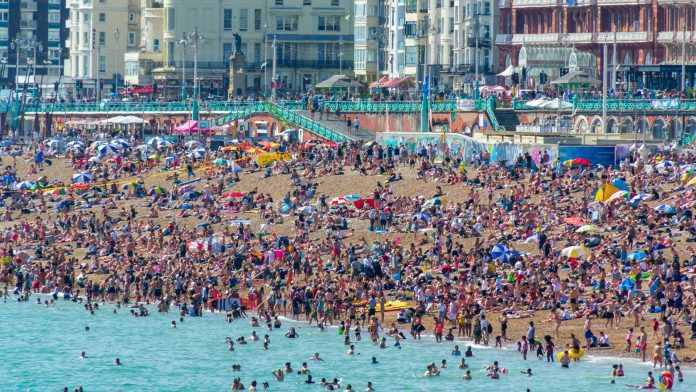
Due to this week’s UK heatwave, a heat-health alert has been issued by the UK Health Security Agency (UKHSA) and the Met Office to various parts of the country.
The Met Office predicts that temperatures in the UK could rise as high as 33 °C in some areas, with Tuesday expected to be the hottest day of 2022 so far. The increasing heat has prompted the UKHSA to announce heat-health alerts across the country to protect vulnerable people, such as the elderly.
David Oliver, Met Office Deputy Chief Meteorologist, commented: “The warm weather over much of England and Wales could last for much of this week. In the short term, many can expect temperatures in the low 30s Celsius this week. Much of this week will remain warm for the time of year as well as dry and sunny for many areas.”
Where has been issued a heat-health alert?
A level 2 heat-health alert has been given to the South West, East Midlands, West Midlands, North West, Yorkshire, and the Humber regions. The East of England, South East, and areas of London have now been placed under a level 3 heat-health alert. The alerts will stay in place from 9 am on Monday 11 July to Friday 15 July.
Dr Agostinho Sousa, Head of Extreme Events and Health Protection at UKHSA, said: “Heat-health alerts have now been issued to the majority of the country, with temperatures set to remain consistently high throughout the duration of the week.
“Most of us can enjoy the hot weather when it arrives, but it is important to keep yourself hydrated and to find shade where possible when UV rays are strongest, between 11 am and 3 pm. If you have vulnerable family, friends and neighbours, make sure they are aware of how they can keep themselves protected from the warm weather.”
Tips for staying safe in the Sun
The UKHSA has published recommendations to ensure safety during the heatwave, which includes:
- Look out for those who may struggle to keep themselves cool and hydrated – older people, those with underlying conditions and those who live alone are particularly at risk.
- Stay cool indoors by closing curtains on rooms that face the Sun – and remember that it may be cooler outdoors than indoors.
- Drink plenty of fluids and avoid excess alcohol.
- Never leave anyone in a closed, parked vehicle, especially infants, young children or animals.
- Check that fridges, freezers and fans are working properly.
- Try to keep out of the Sun between 11 am to 3 pm when the UV rays are strongest.
- Walk in the shade, apply sunscreen and wear a wide-brimmed hat, if you have to go out in the heat.
- Avoid physical exertion in the hottest parts of the day.
- Make sure you take water with you if you are travelling.
- Take care and make sure to follow local safety advice if you are going into the water to cool down.
- Check medicines can be stored according to the instructions on the packaging.

























